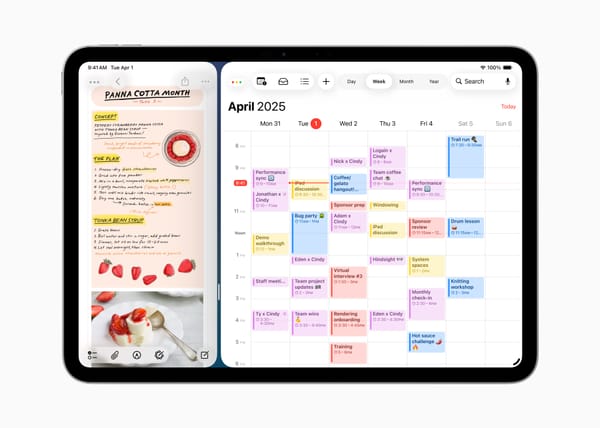Why I believe the fediverse is the future
When I pushed my new site up yesterday after having some small DNS hiccups, I added a few new things that are geared for interaction and sharing with the fediverse.
When I pushed my new site up yesterday after having some small DNS hiccups, I added a few new things that are geared for interaction and sharing with the fediverse. In my updated introductory paragraph (what a mouthful), I also state the following:
[I] am a supporter of a decentralized, federated internet with services like Mastodon and PeerTube to help sustain cultures on a technological level.
The fediverse is becoming a part of my life more closely than it has before. I started using Mastodon in my senior year of high school when I was attempting to transition away from centralized services in favor of open-source solutions. Although I now happily still use a Mac, Mastodon remains an important part of my workflow. During my first semester of college, I also gained interests in PeerTube and PixelFed (now with federation support, yay) and have begun seeing the future of the internet a little bit differently. With these recent changes and new things I’ve learned, I now firmly believe that the future of cultural sustainability, at least on a technlogical level, rests in the fediverse.
What’s cultural sustainability?
In my first semester at Goucher College, I had the opportunity to get a basic understanding for what cultural sustainability is. The term doesn’t have a proper definition that can be found easily in a dictionary as it remains relatively new, but I’ve come up with a working definition:
To maintain and foster relationships between people, embrace and form community through the human condition, respect others and the environment, and emphasize expression to make a culture1 last for a given period of time.
At the basic level, cultures (and communities) form as a result of relationships being formed between people, the environment, and themselves. Relationships also rely heavily on open communication to help make those relationships last. This mostly occurs because we are social beings and rely on interaction and feedback from other beings. This is commonly observed in gift exchanges, especially when described by authors like Lewis Hyde. This, in turn, affects many parts of a culture, from policy-making and regulation-making to preservation and maintenance of the environment.
How does this apply in the social network space?
Social networks are tools for us to openly communicate with each other across long distances as a means of maintaining said relationships. They are gateways to self-expression, opinion, and communication for people from all kinds of cultures. In theory, the ideal social network will allow us to communicate with each other without restrictions set by social network owners or loss of freedom due to fear of backlash. In my op-ed, “Gophers and Elephants: A Mastodon-Supported Goucher Community”, I address this fact and the unfortunate reality that comes from social networks.
In recent years, networks have become more centralized. Rather than an open, federated network that can support different cultures and communities, everything has folded under a single umbrella governed by US law. For those that live in the United States, this isn’t necessarily a bad thing; however, this kind of control of data does not promote or contribute to cultural sustainability as we know it. Centralized social networks force cultures to conform to a set of rules and change relationships to operate a specific way. Furthermore, gifts that are shared through social networks start to lose meaning and become a commodity instead, if not rejected outright. To be clear, I’m not stating that global networks following US law is causing this problem, but it isn’t helping solve it, either.
Part of the issue lies in the fact that we are moving to a globalized society that isn’t compatible with decentralized, local networks. This is commonly seen with imported goods being cheaper than local goods, local economies crumbling due to globalization, and a few other scenarios. While globalization has its advantages, it also strips out local cultures and communities for profit and outreach. In a way, globalization is rather hostile towards cultural sustainability.
How does the fediverse help with this?
In contrast, the fediverse just operates differently. Rather than a network falling under a single umbrella, the network is disbursed across the globe and federates with each other. These networks interoperate with each other and creates communities and helps foster relationships. With services like Tumblr banning adult content, many have migrated over to Mastodon and other federated services to continue sharing art that may not be acceptable under U.S. law. Furthermore, rather than the network being maintained by a single entity, the fediverse is maintained by many people from many different cultures. Futhermore, it feels more likely that federated, decentralized social networks put the emphasis on fostering relationships rather than control and censorship of data, which, in turn, helps sustain cultures.
What can we do?
A lot can be said about what should be done to maintain and foster cultures through decentralized social networks. However, it is unlikely that we can convince everyone to move this way. While we can’t simply “take over the world” and get everyone in this environment by force, we can at least work on a transition. I aim to bring the fediverse to Goucher, starting with my op-ed; hopefully, I can work on helping sustain Goucher’s culture through the fediverse. If we take steps to help people come to the fediverse, we’re on the right track to helping sustain our cultures in the technological space.
- Note that the term “culture” can be used loosely to define communities that aren’t typical human-interaction, tradition-based cultures found in the physical world. In the context of this definition, I will not refer to this. ↩︎





